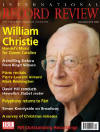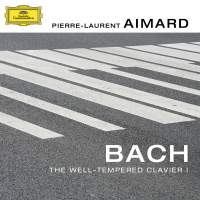Texte paru dans: / Appeared in:
*

International Record Review - (12//2014)
Pour
s'abonner / Subscription information
Deutsche Gramophon
DG4792784

Code-barres / Barcode
: 0028947927846 (ID469)
Consultez toutes les évaluations recensées pour ce cd
~~~~ Reach all the evaluations located for this CD

The justification for any pianist to undertake a new recording of Bach's Das wohltemperierte Clavier ‑ or any other major work in the keyboard repertory for that matter ‑ has, in the wake of many available outstanding recordings, to be compelling, as any pianist currently before the public who knows these Preludes and Fugues from daily practice, and will play them to a high standard.
Perhaps more than any other of Bach's keyboard works, the '48' speaks directly to the individual; surely, one might feel, no 'audience' is necessary for such essentially intimate 'one‑on‑one' music as this? Were not these works written to solve, for Bach, certain technical problems, not necessarily to be considered as 'Public' utterances? That view, which was certainly current when I was a young student, has ‑ thanks to Rosalyn Tureck's ground‑breaking set of 1952‑53 ‑ been shown to be at best one‑sided, although it is still held in some quarters, for there are aspects of Pierre‑Laurent Aimard's performances in Book I which remind me of the widespread general reaction to Tureck 60 or so years ago.
At first, I felt Aimard to be too technically clean and adept, more concerned with clarity and precious little else. But clarity in Bach (clearly in pianistic terms) is essential ‑ a prerequisite before anything else is attempted, and before long I realized that, rather than being too 'cool' and unromantically inexpressive, Aimard's approach is surely one that demonstrates the essence of Bach's music ‑ its serenity.
As this realization gradually dawned upon me, I listened again, and again ‑ and once more again ‑ to the point where I have ended up not necessarily agreeing with every strand of contrapuntal expressiveness from Aimard (any more than I would claim a performance of Beethoven's Op. 101 to be perfect), but secure in my belief that Aimard's intellectual and expressive artistry, allied to his technical excellence, are such as to constitute his own fundamental approach to all music ‑ which, of course, for a pianist, means all music for the piano composed after Bach's '48'.
For Aimard, as I have concluded over the several weeks I have played this set of recordings, his grasp of Bach's testament has illuminated all subsequent music for him ‑ even that from the height of the Romantic era, and from our own time. No wonder Ligeti dedicated one of his Études to Aimard, having heard him play technically demanding modern music with a grasp of its inner life, for only someone whose technique and musical understanding comes from a profound knowledge of the expressive interplay of Bach's counterpoint can be so intellectually commanding as Aimard: not merely a 'technical problem' solved, but one in which the solution itself can lead on to deeper expression. Nowhere is this more true than in the telling E flat minor Fugue, so cleanly played entirely without pedal at a suitably slow tempo. At first, the listener might feel this is emotionally bereft, the more so after the incomparable Prelude that precedes it, but subsequent listening has convinced me that Aimard's approach is at all times fully mindful of the contrast between Prelude and Fugue ‑ the 'Romantic' expression, so often applied to this work, can be shown to be an alien concept in music so intimate, so self‑communing, so essentially restrained, as Aimard reveals ‑ and his final cadence of the Prelude is more than magical.
I decided, when I began to
write this review, that I would not pick out this or that Prelude or Fugue
for special mention ‑ but find myself doing so, in order to make the overall
point that this sterling artist's approach is one which cannot be 'taken in'
at one sitting, nor ‑ I fully admit ‑ will it find universal acclaim. For me
this is a wholly exceptional achievement which is more than worth the
attention of all musicians, especially as the recorded sound is consistently
clean and 'open', and the booklet contains a thoughtful short essay on the
genesis and impact of the music by Andreas
Glöckner.
Fermer la fenêtre/Close window
Cliquez l'un ou l'autre
bouton pour découvrir bien d'autres critiques de CD
Click either button for many other reviews


